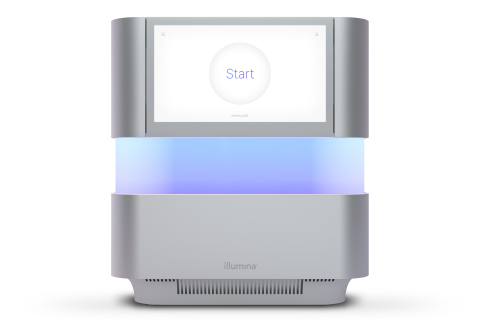Now Commercially Available, Both NextSeq 1000 and NextSeq 2000 Sequencers Include Integrated Informatics and Loss-less Compression Technology, Creating an Intuitive User Experience
SAN DIEGO--(BUSINESS WIRE)-- . Illumina, Inc. (NASDAQ: ILMN) is further extending the reach of the NextSeq™ 2000 Sequencing System with the commercial availability of the P3 high-output flow cell. The P3 flow cell offers 1.1 billion reads in a single sequencing run, almost three times more than previously available on Illumina’s mid-throughput NextSeq sequencing portfolio, expanding the range of applications that run on the system.
This press release features multimedia. View the full release here: https://www.businesswire.com/news/home/20201112005974/en/

Now commercially available, Illumina's NextSeq 1000 and NextSeq 2000 (shown here) Sequencers include integrated informatics and loss-less compression technology, creating an intuitive user experience. (Photo: Business Wire)
“The advanced yet affordable P3 flow cell for the NextSeq 2000 gives customers more capacity to increase the depth and breadth of their projects and the ability to stretch their project budgets, yielding deeper insights,” said Susan Tousi, Chief Product Officer of Illumina. “We’re pleased to further instill customer confidence with the highest data quality ever achieved at commercial launch. Together with the on-instrument integration of our award-winning informatics solution and loss-less compression software, customers can extract actionable insights with a seamless user interface.”
“At University of Edinburgh, our genomics work includes single cell RNA sequencing projects which are often limited by cost,” said Lee Murphy, Head of the Genetics Core at the Edinburgh Clinical Research Facility. “With the NextSeq 2000 and P3 kits, we are experiencing higher output enabling more complex, informative studies which increases the value of our offerings to our world class researchers.”
“The NextSeq 2000 has enabled us to bring sequencing in-house that we would otherwise have to outsource,” said Bryan Venters, Director of Genomic Technologies at EpiCypher, an epigenetic technology company located in North Carolina. “This is critical because it gives us control over our development pipeline. With the release of the P3 cartridge, it will enable higher throughput sequencing and faster turnaround times.”
The P3 flow cell is available in four configurations, including 100-, 200- and 300-cycles, delivering 110 Gb, 220 Gb, and 330 Gb per run, respectively. In response to customer feedback, Illumina is also launching a 50-cycle kit, targeting infectious disease, small RNA, and spatial transcriptomics applications. Additionally, at the outset of 2021, the NextSeq1000 and NextSeq 2000 platforms will come with a tool designed to allow easy recycling of >60% of the reagent cartridge used in each sequencing run.
Illumina also announced the commercial availability of the NextSeq 1000, with an even more accessible price point for sequencing up to 400 million reads per run. Like the NextSeq 2000, the NextSeq 1000 offers onboard informatics for rapid secondary analysis and cloud-based, loss-less compression technology – the first of its kind to offer genomic compression technology built-in. The systems were designed with customers in mind, offering not only a clearer path to deep, actionable insights, but also our most intuitive user experience yet.
“Both the NextSeq 1000 and NextSeq 2000 are designed to simplify workflows and empower labs of any size with the economy of scale to sequence more, more frequently,” said Mark Van Oene, Chief Commercial Officer of Illumina. “With lower run costs, we’re empowering our customers to more freely pursue their research ideas and drive genomics forward.”
The NextSeq 1000 and NextSeq 2000, as well as the P2 and P3 flow cells, are now shipping.
To learn more, visit our website.
About Illumina
Illumina is improving human health by unlocking the power of the genome. Our focus on innovation has established us as the global leader in DNA sequencing and array-based technologies, serving customers in the research, clinical and applied markets. Our products are used for applications in the life sciences, oncology, reproductive health, agriculture and other emerging segments. To learn more, visit www.illumina.com and connect with us on Twitter, Facebook, LinkedIn, Instagram, and YouTube.
Use of forward-looking statements
This release contains forward-looking statements that involve risks and uncertainties, including the expectation for lower costs related to the storing and managing of genomic data costs. Among the important factors that could cause actual results to differ materially from those in any forward-looking statements are: (i) challenges inherent in developing and launching new products and services; (ii) our ability to deploy new products, services, and applications, and to expand the markets for our technology platforms; and (iii) the acceptance by customers of our newly launched products, together with other factors detailed in our filings with the Securities and Exchange Commission, including our most recent filings on Forms 10-K and 10-Q, or in information disclosed in public conference calls, the date and time of which are released beforehand. We undertake no obligation, and do not intend, to update these forward-looking statements, to review or confirm analysts’ expectations, or to provide interim reports or updates on the progress of the current quarter.
View source version on businesswire.com: https://www.businesswire.com/news/home/20201112005974/en/
Media:
Karen Birmingham, PhD
646-355-2111
kbirmingham@illumina.com
Investors:
Juliet Cunningham
858-882-2171
ir@illumina.com
Source: Illumina, Inc.


